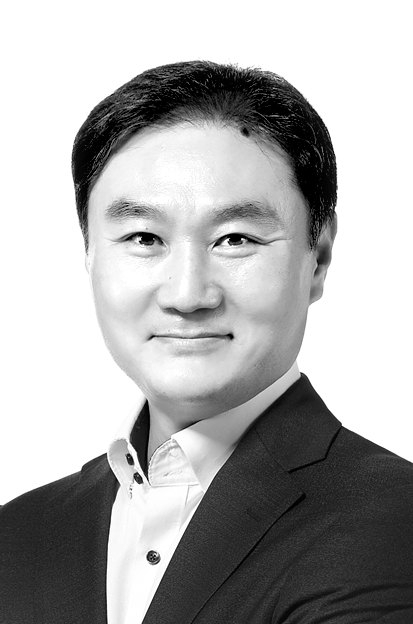Korea's semiconductor Cassandra
이 글자크기로 변경됩니다.
(예시) 가장 빠른 뉴스가 있고 다양한 정보, 쌍방향 소통이 숨쉬는 다음뉴스를 만나보세요. 다음뉴스는 국내외 주요이슈와 실시간 속보, 문화생활 및 다양한 분야의 뉴스를 입체적으로 전달하고 있습니다.

Kim Hyoung-gu
The author is a political news editor at the JoongAng Ilbo. The self-made independent lawmaker Yang Hyang-ja considered herself an optimist. After graduating from a vocational high school, she joined the country’s top company, Samsung Electronics, and competed against employees with postgraduate and doctoral degrees. Thanks to her confidence, she became the first female executive. She had the firm belief that her company — with aggressive investment and passionate engineers — would one day vanquish Japan in chipmaking.
But she is no longer all that hopeful; she has become anxious about the chip industry’s future as well as the country’s as the world competes fiercely for supremacy and self-sufficiency in semiconductors.
Silicon is a brittle crystalline solid with a metallic luster. The material has become indispensable for the production of semiconductors for PCs, mobile electronics devices, displays, automobiles and practically all industrial goods. The world cannot do without semiconductors. South Korea is an IT and digital powerhouse despite a critical lack of natural resources largely thanks to semiconductors.
A chip smaller than a fingernail has become a life-or-death issue in the 21st century. In 2020, Steve Blank, Columbia University’s Senior Fellow for Entrepreneurship and a pioneer in teaching aspiring entrepreneurs about innovation, predicted that advanced chip manufacturing in the 21st century would prove to be like controlling the oil supply in the 20th century. “The country that controls this manufacturing can throttle the military and economic powers of others,” he warned.
The United States has staked all in recovering its chip supremacy. The days are almost gone when the U.S. led in chip design, Japan in materials and parts necessary for chipmaking, Europe in equipment, and South Korea and Taiwan in chip manufacturing. A new alliance of chip-related powers will shake the globe and realign the supply chain in the chip industry. On a trip to Seoul in May after a visit to Tokyo, U.S. President Joe Biden went to a chip facility of Samsung Electronics before starting his state visit, including a summit and a banquet with President Yoon Suk-yeol. Biden’s visit to the Pyeongtaek Campus of Samsung Electronics was meaningful in many ways.
America is readying colossal ammunition to build its chip industry. The CHIPS and Science Act proclaimed on Aug. 9 specified $280 billion in spending to promote U.S. chip technology. It promises 25 percent tax exemptions to companies building chip facilities in America.
Under the Made in China 2025 Initiative, China is spending 200 trillion won ($140 billion) so that 70 percent of all the chips it needs would be supplied at home by 2025. The Taiwanese government’s devotion to the country’s foundry giant TSMC is even more awe inspiring. When Taiwan was hit by a heavy drought last summer, the government supplied TSMC 160,000 tons of water a day for chipmaking. Japan has budgeted subsidies of 774 billion yen ($5.35 billion) for chip production facilities.
Rep. Yang is worried that South Korea is overly sanguine. She became a politician upon recruitment by the Democratic Party (DP) in January 2016. She has been warning about the chip industry for six years. As a DP lawmaker, she championed the need for chip promotion in chat rooms with her colleagues after considering herself the only chip expert in the National Assembly. Her appeals fell on deaf ears as the liberal party was against any privileges to big companies. During questioning sessions on the government, she asked who was in command in the chip war. But she did not get a clear answer from the government.
Rep. Yang was invited to head a special committee for the chip industry set up by the People Power Party (PPP). But the situation has not changed under a conservative government. On August 4, she proposed the Special Act for Chips, an equivalent to the U.S. CHIPS Act. A bill review has been shelved amid the never-ending bickering by rival parties. The industry’s repeated pleas for an increase in student quotas for chip departments in universities in the capital region also has been neglected by the legislature. The special committee of the PPP needs the DP’s support to be institutionalized as an official committee of the National Assembly. But again, it has been buried in political wrangling.
The independent legislator said she found herself sighing while watching the movie “Hansan: Rising Sun,” which portrays Admiral Yi Sun-sin’s Battle of Hansan against Japanese invaders. “While Admiral Yi was battling at sea with his Turtle warship, the royal court was destabilized by factional conflicts. Global powers are at war to control chips which South Korea maintains supremacy over. Yet politicians are engrossed with an in-house battle. The scene sadly overlaps,” she said.
The legislators must set aside their differences to expedite the Korean CHIPS Act and institutionalize a special committee on chip promotion before it’s too late.
Copyright © 코리아중앙데일리. 무단전재 및 재배포 금지.
- Korea to declare war on drugs, administration sources say
- YG Entertainment requests investigation into leak of Blackpink Jennie's photos
- Russians in Korea fear long arm of Putin's mobilization
- [WHY] The highs and lows of Korea's ppalli ppalli culture
- North Korea fires IRBM into Pacific
- Fact is wilder than fiction when it comes to Netflix's 'Narco-Saints'
- Seoul International Fireworks Festival to be held on Oct. 8
- SoftBank CEO Masayoshi Son arrives in Seoul for possible deal with Samsung
- Stalker case involving Kim Tae-hee, Rain sent to prosecutors
- YouTube couple known for their substantial age gap officially wed